Abergorlech is a small village which lies alongside the River Cothi, on the B4310 road, between Brechfa to the southwest and Llansawel to the northeast. The names of the two men from Abergorlech who fell during the Great War are contained on the County War Memorial roll. Another man from Abergorlech has also been identified, and is below. The memorials are possibly within St. David’s Church at Abergorlech, but I have been unable to get there yet to check.
Stephen David Morris, Private, 52753, Cheshire Regiment. Stephen was born in Abergorlech in 1891, the son of Richard Morris and Ann Morris (nee Griffiths). His parents had taken over the Drover’s Arms at Abergwili by 1901, and then the Black Ox, at Abergwili. Stephen left home as a young man to work as a Grocery Assistant and by 1911 was lodging at 7, Bute Street, Aberdare. He was lodging at 7, Pleasant View, Tylorstown when war erupted and enlisted into the 21st Battalion, Welsh Regiment at Porth on 9 December 1915. Stephen was initially placed on the Army Reserve, and was not mobilised until 24 March 1916 when he attested at Cardiff and was posted to France on 28 June 1916, joining the 13th Battalion, Welsh Regiment, which was on the Somme, attached to 114 Brigade, 38th (Welsh) Division. He would possibly have taken part in the Divisions famous assault on Mametz Wood the following month. On 1 September Stephen was transferred into the 11th Battalion, Cheshire Regiment, which was attached to 7 Brigade, 25th Division. On 31 October 1916 the Division moved to the Ploegsteert Sector, and took part in the opening of the Passchendaele Offensive, the Battle of Messines Ridge, on 7 June 1917. Stephen was wounded at Messines, and sadly died of his wounds at the Casualty Clearing Station at Bailleul on 8 June 1917, aged 26. He is buried in Bailleul Communal Cemetery Extension, France.
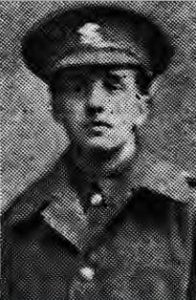
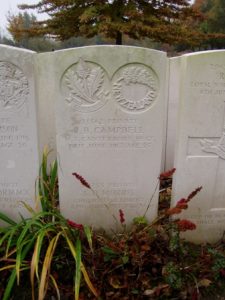
Lloyd Owen Lloyd Price, Rifleman, R/5798, King’s Royal Rifle Corps. Lloyd was born in 1884, the son of Meredydd Lewes Willy Lloyd Price and Frances Margaret Lloyd Price (nee Lloyd), of Castle Pigyn, Abergwili. His father was a Solicitor and later moved the family to Bryn Cottage, Nantgaredig. When war broke out, Lloyd was in Rhodesia, working as a Mining Engineer. He returned to Britain to enlist on 13 October 1914, and enlisted into the Kings Royal Rifle Corps at Winchester on 13 October 1914. Lloyd was drafted out to France on 23 November 1914, joining the 2nd Battalion, King’s Royal Rifle Corps, which was attached to 2 Brigade, 1st Division, and had been on the Western Front since the outset of war, fighting in the tremendous rearguard actions of Mons and Le Cateau and ended up on the Marne, where the German drive on Paris was stopped at the Chemin Des Dames Ridge. Just before Lloyd joined the 2nd KRRC, the battalion was in trenches near Hooge, to the east of Ypres. The battalion endured a torrid time here, constantly under shellfire and German attacks, in terrible conditions, but was relieved on 16 November and moved to Westoutre to rest and refit. It was here that Lloyd joined his battalion, on 23 November. The Division then moved to the Cambrin Sector, another terrible place, near Loos and started off the New Year beating off German attacks along their lines. On 3 January the battalion was relieved and marched back to billets at Cambrin, from where the men were sent in batches to Bethune to enjoy hot baths. On 8 January the battalion moved back into the trenches, which were in a terrible condition, flooded and muddy, so the men were put to work improving them, before preparing to launch an attack against the Germans. Lloyd is recorded as having died in unknown circumstances during this attack, at Cuinchy on 10 January 1915. The 30-year-old has no known grave, so is commemorated on the Le Touret Memorial, Richebourg L’Avoue, France.
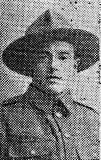
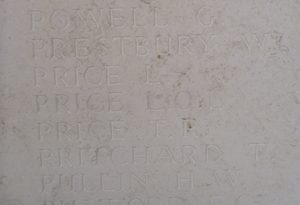
Thomas Williams, Private, 4123, Welsh Regiment. Thomas was born in Pembroke in 1892, the son of William Williams and Elizabeth Williams (formerly Cadogan). The family then moved to Graig, Llanfynydd, where Elizabeth took up the post of Headmistress at Clawddowen schoolhouse. At the outbreak of war, Thomas enlisted at nearby Llandeilo into the 1/4th Battalion, the Welsh Regiment. The battalion was the local Territorial unit and mobilised for war at Carmarthen in August 1914, as part of South Wales Brigade, Welsh Division and moved to Tunbridge Wells until the end of the month, before moving to Scotland to man the Forth and Tay Defences. The remainder of the Welsh Division then moved to Bedford, where it became numbered as the 53rd (Welsh) Division, and on 17 April 1915 the 4th Welsh moved to Bedford, joining 158 Brigade, of the 53rd (Welsh) Division. On 19 July 1915 the entire Division sailed from Devonport for Imbros and on 9 August 1915 landed at C Beach, south of Lala Baba, in Suvla Bay. The infantry moved off the beaches across the Salt Lake, under shellfire, into the scrub covered Chocolate Hill, but due to a lack of maps and no knowledge of the terrain, many of the units became disorientated, and the situation became chaotic. After the fighting died down, the winter rolled in, and the men first had to endure torrential downpours, which flooded the trenches, before the snow hit, and many men began falling ill in the terrible conditions. Thomas was taken ill at some stage, and brought back to the Military Hospital at Malta, where he died of pneumonia on 7 December 1915. The 23-year-old was buried in Pieta Military Cemetery, Malta.
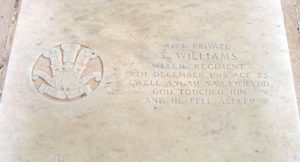
Walter Williams, Private, 4552, Pembroke Yeomanry. Walter was born in 1890, the son of Elizabeth Williams, of Wheaten Sheaf, Abergorlech. He was a carpenter prior to the war, and enlisted at Carmarthen into the Pembroke Yeomanry on 14 November 1914. Walter served on home service for almost a year, probably with the 2/1st Pembroke Yeomanry. He became ill, and was admitted to the 2nd Cyclist Brigade Field Ambulance at Oxford, where he was diagnosed as suffering from tuberculosis. Walter was discharged from the Yeomanry as unfit on 13 October 1916. He died at the Wheaten Sheaf, Abergorlech on 8 July 1918, aged 28. Walter’s case was passed to the CWGC in August 2013 and he was rejected on Wednesday 9 December 2015, due to insufficient evidence to tie in his death as being due to his service.